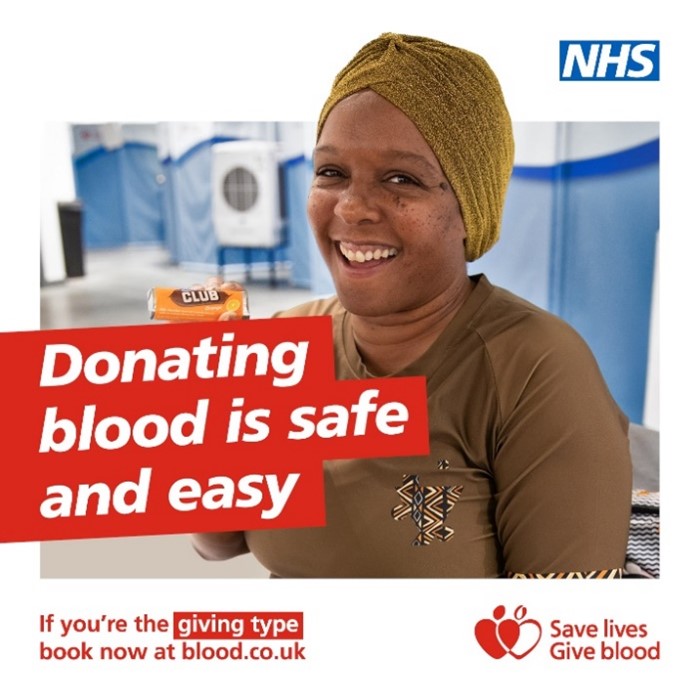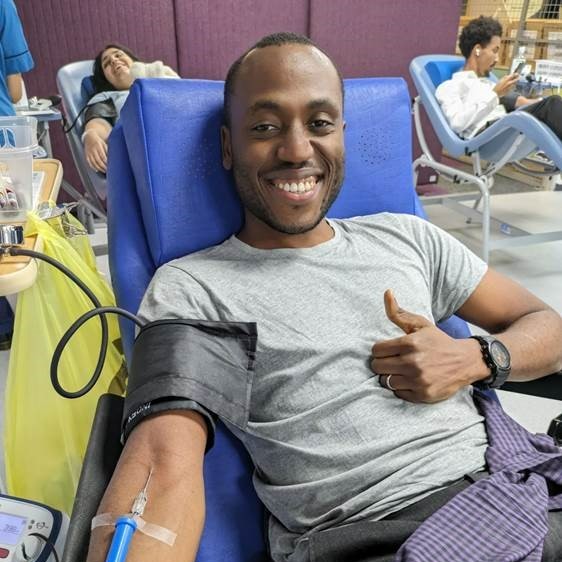The challenges of recruiting more blood donors
The great news is that advances in medicine can potentially help more patients with blood disorders, but there are challenges to get enough donated blood to meet the growing demand to treat these patients. More young blood donors and blood donors with Black/African-Caribbean heritage are needed to provide a larger pool of donated blood as lifesaving support for people with blood conditions including blood cancers and sickle cell disorders.
Did You Know?
NHS Blood and Transplant (NHSBT) has a marketing and communications team devoted to motivating more people to give blood. The NHSBT team currently focusses on the urgent need to find more blood donors for people with sickle cell disease as many people with this condition need frequent well-matched blood transfusions as a life-saving treatment.
Helping Sickle Cell Patients
Sickle cell disorder is an inherited condition where red blood cells do not function properly, and many patients need regular blood transfusions. Sickle cell disorder is more common in people with Black heritage, who often have different blood groups than people with European decent.
In 2017, there were changes in guidance to how the NHS treats sickle cell, advising regular transfusions to reduce the likelihood of patients going into crisis. To get the best treatment, patients need blood which is closely matched. This is most likely to come from a donor of the same ethnicity. Although NHSBT meets demand through other donors, this treatment does not provide the best possible match for those who receive regular transfusions. Currently NHSBT can only meet around half of the demand for Ro subtype blood, often needed for people with sickle cell, with existing blood donors and demand for this rare blood type is rising.
For many reasons, the percentage of Black/African-Caribbean blood donors was low leading to blood shortages for those in need. To change this NHSBT’s marketing campaign now targets people with Black heritage to recruit new blood donors. The NHS needs 12,000 new Black heritage donors to give blood in England alone. Black people are 10 times more likely than White people to have the Ro blood subtype, which is vital to treat sickle cell. Since 2017 the number of new Black heritage blood donors doubled with 6% of new donors compared to 4% of population, starting at 1% in 2017.
Black Heritage First
In October 2022, NHSBT launched its partnership with Marvel Studios' Black Panther: Wakanda Forever. This motivated a record 884 people to donate on its first day. The following week saw a 700% increase in registrations from people with Black/African-Caribbean heritage.
Acting On Good Intentions
Motivating people to donate blood is important and it is the ultimate action of donating blood that helps to save lives. Why do many people sign up to give blood, but then don’t donate? There is no simple answer and many challenges.
Often there are questions about how to donate blood, a fear of the process, and embarrassment around this fear. Sometimes if people are unable to donate, they feel disappointed which sparks feelings of rejection. There are also many practical reasons which make donation difficult such as location and opening times of blood donor centres, difficulties booking appointments, lack of time or taking time off work to donate.
To tackle these challenges, NHSBT’s staff and volunteers are out at events, visiting companies and business shows to use local knowledge to find out where blood donor sessions can be held at greatest convenience.
As a result, NHSBT is about to open a new blood donor centre in Brixton, South London, which has a multi-ethnic community including a large community of people with Black heritage. NHSBT are also working with influencers and media which are relevant to this audience, including podcasts, community TV, relevant interest targeting as well as bespoke direct communications.
A Workshop About Blood Donor Recruitment
On 13 November 2023, two Blood and Transplant Research Units (BTRUs) and the NHSBT marketing team held a workshop to present their recruitment strategies and discuss questions and ideas with blood donors and patients.
Learnings From The Workshop
It was a brilliant opportunity to hear about work from the NHSBT team, learn about challenges and voice questions and ideas. Suggestions for turning good intentions into actual blood donations were:
- A no-commitment pre-donation drop-in sessions at blood donation centres to give time for people to discuss their concerns without fear of embarrassment. These sessions are currently in trial
- Reassurance that there are no silly questions
- Make people feel special. Blood donors are not a percentage, they are uniquely saving up to three lives (potentially) with their one donation
Questions on blood donation & answers from NHSBT:
Can I donate blood if I take iron non-prescribed supplements/spray?
- Generally, we are only interested if the donor has been told to take a supplement (vitamin or iron) by their doctor (or another clinician). Even then this shouldn't stop donation assuming the reason for treatment has settled. There is a specific mention in the donor selection guidelines that taking iron to prevent recurrence of anaemia does not exclude the donor
Can I donate blood if I have anaemia?
- Blood donors with anaemia need to wait for their anaemia to resolve before they can donate blood again. Taking blood from a donor with anaemia could make their anaemia worse and may result in tiredness or breathlessness. At a blood donor session, a finger prick test is done to ensure donors have enough blood to spare before the donation
Can you donate blood if you have diabetes?
- Many people can, especially those with type 2 diabetes. You cannot give blood if you have type 1 diabetes and use insulin. If you do not use insulin or are a type 2 diabetic then you can donate if your diabetes is well managed, and you are in general good health. For other reasons why you may not be able to donate blood with please use our eligibility checker
What happens after a blood donation?
More information about blood donation and guidelines
- Visit the Give Blood website to get more information about blood donation
- Search for blood donation guidelines on the transfusion guidelines website
- View the section 'care and selection of whole blood and component donors' on the transfusion guidelines website
About NHS Blood and Transplant (NHSBT)
NHSBT provide a blood and transplantation service to the NHS, looking after blood donation services in England and transplant services across the UK. NHSBT also manage the donation, storage and transplantation of blood and blood components, organs, tissues, bone marrow and stem cells.
Learn more about NHSBT on their website.
About Blood and Transplant Research Units (BTRUs)
Blood and Transplant Research Units are research partnerships between universities, hospitals and NHSBT to improve blood and transplant services for NHS patients. There are currently five BTRUs, looking into different areas of blood and transplant research.
More information about our BTRUs is available under the current research section of our Research and Development website.
The following two BTRUs collaborated with NHSBT for this workshop:
BTRU in Donor Health and Behaviour
This unit looks at research to address major challenges including more ethnically diverse range of people to donate blood, developing new methods for recruiting and retaining donors, promoting safe and effective donation practices and finding risks of adverse health effects of blood donation.
Learn more about the BTRU on the donor health website.
BTRU in Data Driven Transfusion Practice
Does research bringing together and using routinely collected data at all steps in the transfusion chain to improve (blood) transfusion practice.
Learn more about the BTRU on the Radcliffe Department of Medicine website.
Acknowledgements
Thank you to all attendees, to the marketing team at NHSBT for sharing insights into their important work and especially to Brenda Smith, Elisabeth Morse and Roxane Stirling, blood donors and patient and public partners at BTRUs, for their contribution to co-develop this workshop with BTRU Patient and Public Involvement Managers Anne Forde and Linda von Neree; and for their input on this blog post.


